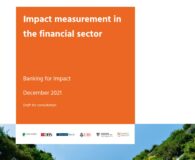
Bron
Impact Institue
The Banking for Impact (BFI) working group published the consultation drafts of the guide on Impact measurement in the financial sector and its supplement.
Financial institutions are increasingly required to understand and monitor their social and environmental impacts driven by the demands of their stakeholders including investors, clients, and employees, as well as regulators, standard setters and sector initiatives.
For example, as required by the Principles for Responsible Banking, financial institutions will need to identify and analyse their significant impacts and report on progress. Similarly, the Sustainable Finance Disclosure Regulation requires banks to report on a set of principle adverse impact indicators. Earlier this week, the G7 Impact Task Force urged to make impact accounting standards for business and finance mandatory. Earlier this month, the Value Reporting Foundation issued their Integrated Thinking Principles prototype which helps to strategically assess the resources and relationships an organization uses or affects and the dependencies and trade-offs between them. In July 2021, the Value Accounting Network was launched under the ambition that the value that flows between nature, people, society and the economy must be included in decision-making.
Beyond meeting requirements, financial institutions, as the primary drivers of capital, are in the perfect position to lead and accelerate solutions to societal challenges. Gaining insights into its social and environmental impacts, allows a financial institution to create lasting value for all stakeholders. However, getting a grip on these impacts can be a complex task and current approaches are often lacking robustness and do not allow for comparison across organisations.
Impact Institue is very proud to announce that, the Banking for Impact (BFI) working group published the consultation drafts of the guide on Impact measurement in the financial sector and its supplement. The guidance document for impact measurement helps organisations to start measuring their impact. It gives an overview of the necessary steps and inputs to perform impact assessments. The supplement is complementary to the measurement guide, as it provides a classification of activities, related impacts and relevant data sources that can help further facilitate consistency and comparability.
Both documents are based on the draft Impact-Weighted Accounts Framework (IWAF) developed by the Impact Economy Foundation in collaboration with a.o. Harvard Business School’s Impact Weighted Accounts Initiative, Singapore Management University, Rotterdam School of Management and Impact Institute.



